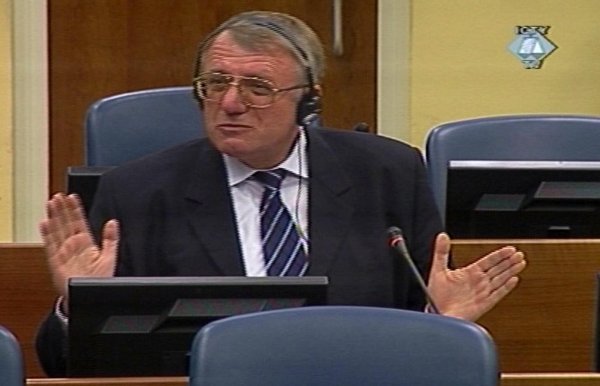Home
SESELJ WANTS LIFE SENTENCE
When the presiding judge lectured him on the proper way to conduct his defense, Seselj said he wasn’t concerned about the judges not believing his claims. His arguments were not addressed to them, he explained, but to the public. Seselj urged the judges not to be concerned, because it was his goal to be sentenced to life
 Vojislav Seselj in the courtroom
Vojislav Seselj in the courtroom Vojislav Seselj is sure that in the two days of his cross-examination he ‘crushed’ the prosecution expert Yves Tomich, proving not only that Tomich was not qualified to testify about his Greater Serbia ideology, but also that he was biased and partial.
At the beginning of the hearing today, presiding judge Antonetti tried to shake Seselj’s belief but to no avail. Noting the fact that it was his duty to ensure that the accused gets a proper defense, Judge Antonetti warned Seselj that in his cross-examination of Tomich he ‘put forward unsubstantiated claims with little or no weight instead of asking him questions’. It wasn’t enough to claim somebody was ‘a false witness’, Antonetti pointed out: such allegations must be proven. Claiming that events did not take the course described by the witness was also useless, unless substantiated by evidence.
Seselj was obviously not glad the judge lectured him on the way he should proceed with his defense in the presence of his legal advisors. He was not concerned about the judges not believing him, he retorted, because he was not addressing them, but the public. Seselj urged the judges not to be concerned with his defense, because it was his goal to be sentenced to life.
The prosecution then called a new witness, testifying under the pseudonym VS004. Based on his evidence, it can be concluded that he was an official of the SDS and the Western Slavonia SAO, and that he advocated the peace option. He went to Zagreb to negotiate with the then president Tudjman in an effort to find a peaceful solution and avoid the war.
As he began his evidence, the witness spoke of the establishment and activities of the Serbian Democratic Party in Croatia, the establishment of Serbian autonomous districts, first in Krajina, and then in Eastern and Western Slavonia. He described his relationship with Milan Babic and Goran Hadzic, the political split in the SDS into a democratic and an extreme nationalist wing. The witness went on to describe the first clashes between Serbs and Croats in Pakrac, Plitvice and Borovo Selo in the spring of 1991.
In the course of his examination, the prosecutor showed a segment from the series Death of Yugoslavia about the Borovo Selo incident. Some Croatian policemen were kidnapped in the village on 1 May 1991, and the forces sent in to free them were ambushed on 2 May 1991. Twelve Croatian police officers were killed and some twenty injured in the incident. The footage showed Seselj outlining the course of the operation and the role of his volunteers to BBC journalists. In his words, they fought back the Croatian policemen in the ‘crucial first half-an hour, before the rest of the village went up in arms.’
When the judges asked who opened fire first – the Serbian volunteers or the Croatian police – the witness said that there were ‘two versions, two stories: one Serbian and the other Croatian’.
The prosecutor went on to show a video recording of a rally held on 15 May 1991 in front of the Federal Assembly in Belgrade. While Seselj spoke about the ‘victory over the Ustashas’, his followers were chanting ‘revenge, revenge’ and ‘we will kill Mesic’. When the prosecutor asked the witness to confirm whether the footage was an example of a ‘typical’ public address by Seselj, the witness did so. ‘The Croats were not glad to hear him speak, but the Serbs were glad that somebody cared for their interests in that way’, the witness clarified.
The evidence of the protected witness VS 004 will continue next Tuesday.
Linked Reports
- Case : Seselj
- 2008-02-06 RIGHT QUESTION FOR THE WRONG WITNESS
- 2008-02-05 DOCTOR OF LEGAL SCIENCE VS. MASTER OF ARTS
- 2008-01-30 SERBS WOULD BE A MINORITY IN SESELJ’S ‘GREATER SERBIA’
- 2008-02-12 ‘SERBS IN CROATIA DIDN’T KNOW’ SESELJ BEFORE THE WAR
- 2008-02-13 SESELJ’S ‘POINTLESS’ DEFENSE
- 2008-02-14 REGULATING THE IRREGULARS
